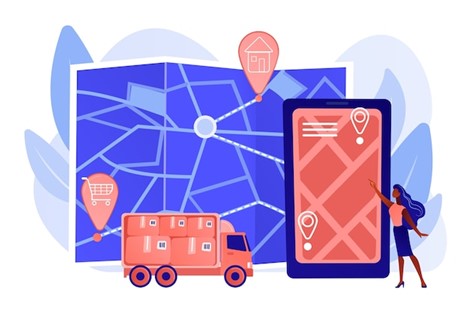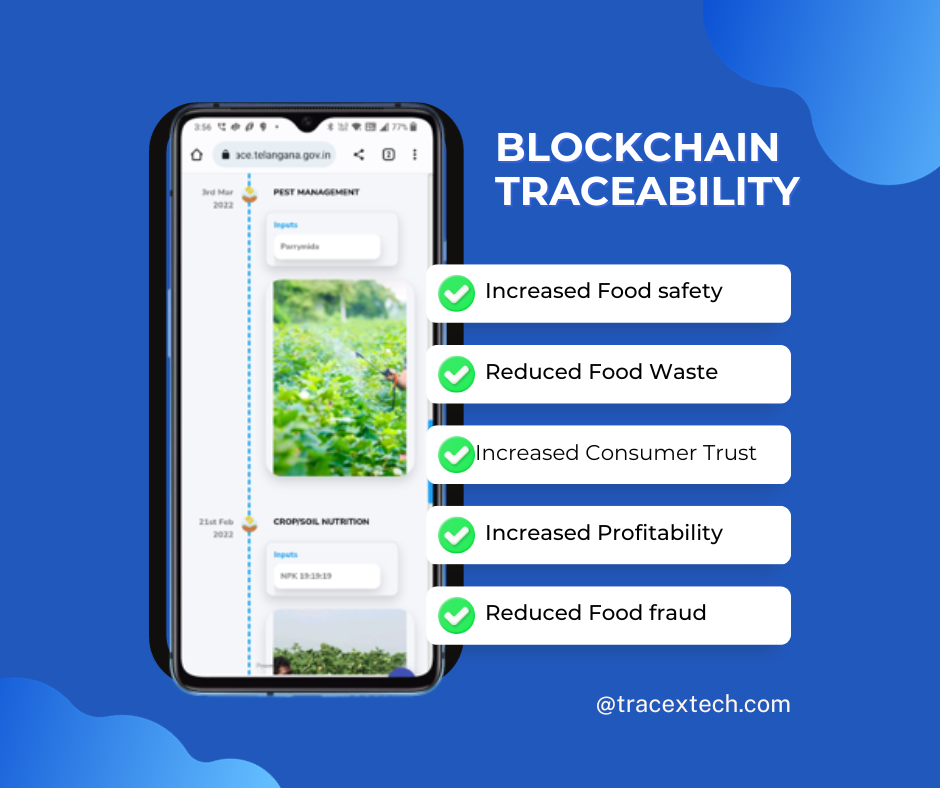Contact: +91 99725 24322 |
Menu
Menu
Quick summary: Embark on a journey through the intricate world of supply chains with our insightful blog on navigating product traceability. Discover key strategies, emerging trends, and practical insights to enhance transparency and efficiency in your supply chain processes. Stay ahead in the dynamic landscape of logistics and make informed decisions with our expert guidance

In our rapidly evolving global marketplace, ensuring the safety, authenticity, and quality of products has become more critical than ever. At the forefront of this effort lies the concept of product traceability – a vital element in today’s supply chains that goes beyond mere compliance.
In this blog, we will understand definition of product traceability, explore its fundamentals, and highlight its implications in compliance, consumer trust, risk mitigation, sustainability, and technology integration.
Product traceability refers to the ability to trace the journey of a product through the supply chain, from its origin to the end consumer. This includes tracking the movement, handling, and storage of products at each stage of the production and distribution process. The ultimate goal is to create transparency and accountability in the supply chain.
In recent years, there has been a growing emphasis on creating transparent supply chains. Consumers are increasingly conscious of the products they purchase, seeking information about their origin, production processes, and ethical considerations. Transparent supply chains not only meet consumer expectations but also serve as a competitive advantage for businesses.
Food safety is a crucial concern impacting all individuals. The assurance of food product safety and quality is essential for safeguarding consumer health, preventing foodborne illnesses, and upholding trust in the food supply chain. A key element in ensuring food safety is traceability, which involves the ability to monitor and trace food products across the entire supply chain, from production to consumption. Traceability systems facilitate the swift identification and recall of unsafe or contaminated products, enhancing the ability to respond promptly to food safety incidents.
In recent times, there has been a heightened recognition of the significance of traceability within the food industry. Consumers are increasingly mindful of the safety and origins of their food, leading to governments implementing more stringent regulations to guarantee the traceability of food products.
At its core, product traceability relies on the ability to assign and track unique identifiers to products. This enables the monitoring of the product’s journey from the manufacturer to distributors, retailers, and, ultimately, the end user. Advanced traceability systems leverage technologies such as barcodes, RFID (Radio-Frequency Identification), and blockchain to streamline this process.
Barcodes have long been a staple in product traceability, offering a cost-effective and efficient means of tracking products. RFID technology takes it a step further by allowing real-time tracking through radio frequency signals. Blockchain, a decentralized and secure ledger, ensures an immutable record of each transaction and movement in the supply chain.
The history of product traceability dates back several decades, but recent technological advancements have transformed its landscape. From manual record-keeping to automated systems, the evolution of product traceability has mirrored the broader digital transformation of industries.
Governments and international bodies recognize the importance of product traceability in safeguarding public health and ensuring fair trade practices. As a result, there are global regulatory requirements that mandate traceability standards. These regulations vary by industry and region but share the common goal of creating a more accountable and transparent supply chain.
Different industries face unique challenges and, consequently, have tailored compliance standards. For example, the food industry must adhere to strict traceability standards to prevent and manage foodborne illnesses, while the pharmaceutical industry focuses on traceability to combat counterfeit drugs.
Concerns arise regarding the bleak financial consequences associated with food recalls. The tightening of product traceability requirements, driven by legislation like the Food Safety Modernization Act, and the expansion of global supply chains have led to a notable surge in the number of food recalls.
Consumers today are not just buyers; they are conscientious decision-makers. They expect transparency and accountability from the brands they choose. Product traceability meets this expectation by providing consumers with detailed information about a product’s journey, including its origin, production processes, and handling.
Transparency is a key driver of brand loyalty. When consumers can trace the origins and production processes of a product, they are more likely to trust the brand. This trust, in turn, fosters loyalty, encouraging repeat purchases and positive word-of-mouth marketing.
Supply chains are inherently susceptible to various risks, including disruptions, quality issues, and geopolitical factors. Product traceability plays a vital role in identifying and managing these risks. By providing real-time visibility into the supply chain, businesses can proactively address potential challenges.
In the unfortunate event of a product recall, traceability systems enable swift and targeted responses. Identifying affected products becomes significantly more efficient, minimizing the impact on consumers and reducing the financial burden on the business.
According to the Grocery Manufacturers Association, in the US, 52 % of food recalls cost more than $10 million, while 23 % of these recalls cost over $30 million.
Quality control and safety are paramount in industries such as food, pharmaceuticals, and automotive. Product traceability ensures that each product meets the specified quality and safety standards by enabling the tracking of raw materials, production processes, and distribution.
In an era where sustainability and ethical sourcing are integral to corporate responsibility, product traceability plays a pivotal role. Consumers increasingly demand information about a product’s environmental footprint, ethical sourcing practices, and overall impact on society.
By tracing the supply chain, businesses can identify areas for improvement in sustainability and ethical sourcing. This may involve reducing carbon emissions, ensuring fair labor practices, or sourcing materials from environmentally responsible suppliers. Traceability empowers businesses to make informed decisions that align with consumer values.
Certifications such as Fair Trade, Organic, and Sustainable are becoming more prevalent as consumers seek assurance regarding the ethical and environmental aspects of products. Traceability systems provide the necessary documentation to support these certifications, offering a tangible demonstration of a brand’s commitment to sustainability.
The rapid evolution of technology has ushered in a new era of advanced traceability solutions. Blockchain technology, with its decentralized and tamper-resistant nature, ensures an unalterable record of each transaction in the supply chain. The Internet of Things (IoT) allows for real-time monitoring of product conditions, and Artificial Intelligence (AI) enhances data analysis for more informed decision-making.

TraceX’s blockchain traceability solutions revolutionize product traceability by providing an unalterable, transparent, and efficient system that not only meets regulatory requirements but also elevates consumer confidence and overall supply chain performance.
Utilizing blockchain technology, TraceX ensures an immutable and transparent ledger of every transaction and movement in the supply chain. This creates a tamper-resistant record, instilling a high level of confidence in the accuracy and authenticity of the information.
TraceX offers end-to-end visibility across the entire supply chain. From the initial production stages to the final destination, stakeholders can access real-time data, enabling a comprehensive understanding of the journey a product takes.
The decentralized nature of blockchain provides enhanced security, mitigating the risk of data breaches or fraudulent activities. Each transaction is securely encrypted and linked to the previous one, creating a robust and secure digital trail.
In the event of a safety concern or recall, TraceX’s blockchain traceability allows for swift and accurate identification of affected products. This capability significantly reduces response times, minimizing the potential impact on consumers and preserving brand reputation.
By streamlining the flow of information and reducing manual processes, TraceX enhances overall supply chain efficiency. This not only saves time and resources but also fosters collaboration among stakeholders.
In an era where consumers are increasingly conscious of product origins and safety, TraceX’s blockchain traceability solutions empower consumers with accurate and trustworthy information. This, in turn, builds confidence in the brand and product.
One of the primary concerns in implementing product traceability is the associated costs. However, the long-term benefits, including risk mitigation, improved consumer trust, and operational efficiency, often outweigh the initial investment. Businesses should view traceability as a strategic investment rather than a mere compliance requirement.
As traceability systems involve the collection and sharing of sensitive data, ensuring robust data security and privacy measures is essential. Encryption, secure authentication protocols, and compliance with data protection regulations are critical components of a secure traceability infrastructure.
Successful product traceability requires collaboration across the entire supply chain. This includes cooperation between manufacturers, suppliers, distributors, and retailers. Open communication and standardized processes contribute to the seamless flow of information, enhancing the effectiveness of traceability systems.
In conclusion, the importance of product traceability in today’s supply chains cannot be overstated. Beyond compliance, it’s about humanizing the supply chain – connecting consumers with the stories behind the products they choose. As technology continues to advance, businesses that embrace and invest in robust traceability systems will not only meet current expectations but also forge stronger connections with consumers, positioning themselves for future growth and resilience in an increasingly competitive global market.
